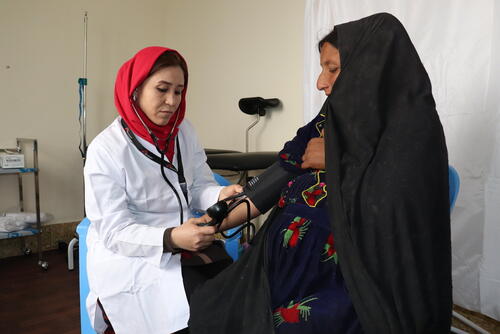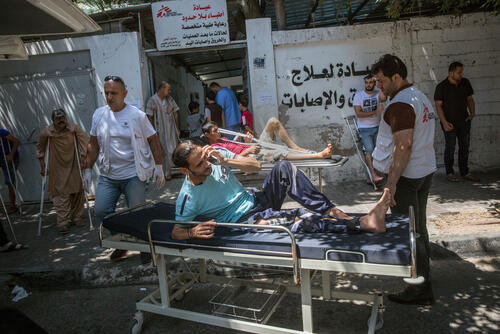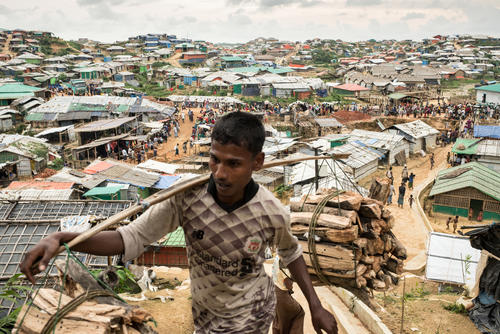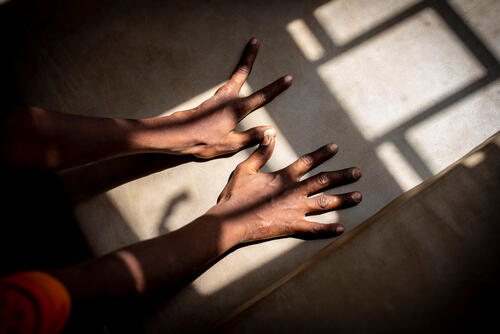
411,700
411,7
74,600
74,6
6,890
6,89
We saw a steady increase in the number of people seeking medical assistance in our facilities in 2018, as the population contended with insecurity, a dysfunctional healthcare system, and internal displacement resulting from violence or natural disasters such as drought. While the conflict severely impedes people’s access to healthcare in Afghanistan, so too do economic issues. Over 50 per cent of Afghans currently live below the poverty line and around 10 million have limited or no access to essential healthcare services.<a href="https://www.unocha.org/sites/unocha/files/dms/afg_2018_humanitarian_needs_overview_0.pdf">United Nations Office for the Coordination of Humanitarian Affairs</a>, and <a href="http://cso.gov.af/en/page/1500/1494/nrav-report">Central Statistics Organization’s Afghanistan Living Conditions Survey 2016-17</a>
Activities in Kabul
The capital has experienced massive population growth over the last decade, as people continue to arrive from other parts of the country, fleeing insecurity or looking for economic opportunities. Returnees from Pakistan and Iran have also contributed to the population increase.
We have supported the Ministry of Public Health in Ahmad Shah Baba district hospital in eastern Kabul since 2009, running outpatient and inpatient services, with a focus on maternal health and emergency care. We started to hand over activities in 2018, transferring outpatient services to the ministry at the end of December. Between 2009 and 2018, our teams conducted over one million outpatient consultations and over 460,000 emergency room consultations. In 2018, we also supported neonatal, paediatric, ante- and postnatal care, surgery, treatment for malnutrition, family planning, health promotion and vaccinations. The remaining maternity activities will be handed over at the end of March 2019.
At Dasht-e-Barchi hospital, we continued to support the Ministry of Public Health to provide 24-hour maternal care. The hospital is the only facility for emergency and complicated deliveries in a neighbourhood with a population of over one million. We run the labour and delivery rooms, an operating theatre, a recovery room, a 30-bed maternity unit and a 20-bed neonatal unit. In 2018, our teams assisted over 15,000 births, and more than 1,300 newborns in serious condition were hospitalised in the neonatal unit. We support maternity care in another hospital in the area with staff, training and essential drugs.
Khost maternity hospital
We have been running a dedicated maternity hospital in Khost, eastern Afghanistan, since 2012, providing a safe environment for women to deliver round the clock. The number of deliveries continues to grow, with the team assisting almost 23,500 births in 2018. It is estimated that MSF assists close to half of the total deliveries in Khost province.
We also support five health centres in outlying districts, increasing their capacity to manage normal deliveries so the MSF hospital can focus on patients with complications. This includes strengthening the referral system to the MSF hospital, providing medical supplies, staff training and financial assistance to recruit more midwives, and constructing new maternity buildings for two of the facilities. We also provide staff and financial and logistical resources to support the maternity department at Khost provincial hospital.

Boost hospital, Lashkar Gah
We have supported Boost provincial hospital, one of only three referral facilities in southern Afghanistan, since 2009. The hospital is located in the capital of southern Helmand province, one of the areas most affected by active conflict, where there is a scarcity of fully functional medical facilities. Checkpoints and insecurity on the roads also make it hard for people to seek care, so patients often arrive at the hospital in a critical state. In 2018, we continued to see significant increases in patient numbers, stretching the hospital to capacity. Our teams assisted over 14,000 births, performed more than 133,500 emergency room consultations and treated almost 5,000 children for malnutrition.
Emergency support in Herat
In April, we started working in the emergency department of Herat regional hospital, one of the largest health facilities in western Afghanistan, and gave staff training on improving patient flow in the hospital, triage and managing mass casualty situations. It is estimated that around 150,000 internally displaced people arrived in the city during the year, from conflict- and drought-affected areas of Herat, Badghis and Ghor provinces. In December, we set up a winter clinic for internally displaced people on the outskirts of the city, with a focus on care for women and children under five.
Drug-resistant tuberculosis (DR-TB) in Kandahar
We have been supporting the health ministry in the diagnosis and treatment of DR-TB patients in Kandahar province since 2016. In that time, 102 DR-TB patients have been enrolled in the programme, and over half have been started on an innovative regimen that reduces treatment time down from at least 20 months. In September, the foundation stone was laid for a new 24-bed TB centre, due to open in the second half of 2019. We also supported the Ministry of Public Health in providing care for drug-sensitive TB patients in Mirwais regional hospital and at the provincial TB centre. Nearly 1,100 cases of drug-sensitive TB cases were diagnosed in 2018 alone.
Trauma care in Kunduz
In July 2017, we opened an outpatient clinic to treat stable patients with wounds from minor burns or trauma, previous surgery, or diseases such as diabetes that cause chronic skin lesions. Our teams treated almost 2,400 patients and conducted over 14,000 follow-up appointments in 2018. We also continued to run a small stabilisation clinic in Chardara district, west of Kunduz city, and started the construction of a new MSF trauma facility in the city.
After the US airstrike that destroyed the trauma centre in 2015, killing 24 patients, 14 staff and four patient caretakers, we engaged in discussions with all parties to the conflict to formalise commitments that MSF’s staff, patients and hospitals will not be attacked. We have explicit commitments that MSF can treat every person who needs medical care, no matter their ethnicity, political affiliations or which side of the conflict they are on.

















